Mar 23, 2018 | Bargaining
Members of the executive of the University of Lethbridge Faculty Association (ULFA) held two workshops on the University of Lethbridge’s Calgary Campus on Wednesday.
The workshops were led by ULFA Vice President Jon Doan, Bargaining Team members Paul Hayes and Dan O’Donnell, Executive Director Annabree Fairweather, and Professional Officer Derrick Antson.
The workshops were well attended and the Bargaining “Meet and Greet” provided an opportunity for members of the Bargaining Team to hear about issues particular to the Calgary Campus, as well as the degree to which members on the Calgary Campus are affected by issues we have discovered across our constituencies.
The Bargaining Team will be holding two more “Meet and Greet” workshops this semester in the run-up to bargaining:
- March 29, 2018 at 1:30 pm. Room PE020. Primary constituency: Arts and Science.
- April 23, 2018 at 12:00 pm. Room L1170A. Primary constituency: Instructors and Academic Assistants.
Although each session is targeted primarily towards the issues affecting a specific constituency, any member is free to attend any session. The session begins with a general discussion of the state of and issues in our current round of bargaining and then moves to discussion and questions from the floor.
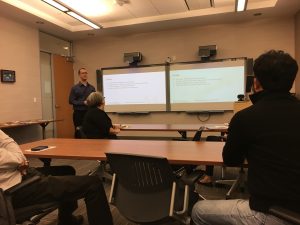
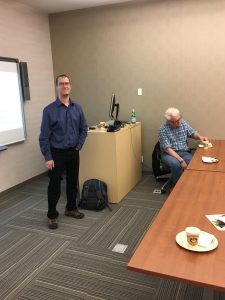
Mar 15, 2018 | Bargaining
The Alberta Labour Relations Board (ALRB) ruled in favour of the core position taken by the University of Lethbridge Faculty Association (ULFA) yesterday in its dispute with the University of Lethbridge.
The case concerned the number of bargaining units and collective agreements to be negotiated between the University and ULFA under the changes to the Post Secondary Learning Act (PSLA) and Labour Relations Code introduced by Bill 7 (You can read more about the history of this case working backwards from this post).
The specific issue before the ALRB was the legal question:
Does the Code allow for or preclude the possibility of more than one bargaining unit for the academic staff and/or more than one collective agreement for the academic staff? (¶ 2)
In its submission, the University administration argued that
- The PSLA left the number of agreements up to the parties to determine;
- The University and ULFA historically had negotiated two distinct agreements (i.e. the Sessional Lecturers’ Handbook and the Faculty Handbook);
- The Labour Relations Code required the continuation of these two agreements as distinct collective agreements. (see ¶ 3)
ULFA, for its part, disagreed with the University’s characterisation of the historical situation, particularly the degree to which the two Handbooks represented completely distinct agreements. With regard to the legal question at issue, it argued
- That the Code established the Faculty Association as the exclusive bargaining agent for a single Bargaining Unit (i.e. the “Academic Staff”) consisting of both Sessional Lecturers and Faculty;
- That the Code precluded the possibility of more than one bargaining unit for the Academic Staff under the current legislative arrangements;
- That the Code precludes the possibility of there being more than one collective agreement to cover this single bargaining unit under the current legislative arrangements. (see ¶ 4)
In its decision, the ALRB upheld the core elements of ULFA’s position, concluding that there was both one bargaining unit under the Code and that the Code precludes the negotiation of more than one collective agreement for that unit:
[T]he PSLA and the Code create a single designated bargaining unit (all academic staff); however, parties may negotiate two or more collective agreements which may contain scope clauses that individually do not comprise all of the designated bargaining unit. The Code precludes more than one collective agreement being negotiated where one of the parties maintains the position that a single collective agreement shall be negotiated for all employees in the designated bargaining unit. Appropriate notice of this position must occur at the commencement of collective bargaining. (¶ 6)
The main place in which the ALRB diverged from the position taken by ULFA and the intervenors concerned the idea that the parties could negotiate more than one collective agreement for a given Bargaining Unit, provided they both agree explicitly to do so. This has potentially profound implications for labour relations in the province. Since ULFA has already indicated that it “maintains the position that a single collective agreement shall be negotiated for all employees in the designated bargaining unit,” however, the question is moot for the purposes of our current negotiations: the ALRB’s decision means that the Sessional and Faculty Handbooks represent a single collective agreement under the Code.
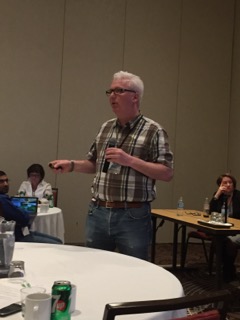
Mar 13, 2018 | Bargaining
On March 9, members of the University of Lethbridge Faculty Association (ULFA) executive, staff, and negotiating team attended the first Confederation of Alberta Faculty Associations (CAFA) labour conference. The one day event took place in Calgary. It was preceded the evening before by a meeting of the CAFA executive with the presidents and staff of the the constituent organisations.
The speakers included a mix of Alberta Faculty Association representatives, representatives from the Alberta Labour Relations Board, labour lawyers, and representatives from other public-sector unions and labour organisations and Faculty Associations in other provinces. Participating Faculty Associations include those from the Athabasca University, the Universities of Alberta, Calgary, and Lethbridge, Grant McEwan and Mount Royal Universities, NAIT and SAIT, Lethbridge College, and many others.
The sessions covered a mix of important issues for the newly designated Faculty Association Unions:
- Summary of current legislative changes that will impact bargaining in PSE: Bill 7, Essential Services, OH&S and the role of the Labour Board;
- ‘Government in the Room’ during Bargaining;
- Essential Services for PSE;
- Preparation for Strike & Lockout Landscape: Protocols, War Chests, Mil Rates;
- Unionizing Post-Secondary: What you need to know;
- Mobilization and communication during bargaining;
- Duty of Fair Representation.
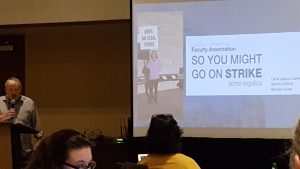
Mike Shaw, University of Manitoba Faculty Association discusses the logistics of job action at the CAFA labour conference.
Among the many interesting presentations, Michael Shaw of the University of Manitoba Faculty Association (UMFA) discussed his experiences managing the logistics of their 2016 strike. UMFA has had the right to strike for over three decades. In that time, they have struck twice (once in 1995 and again in 2016). His account of their preparations stressed the degree to which job action requires great solidarity on the part of Association members… and lots of pylons.
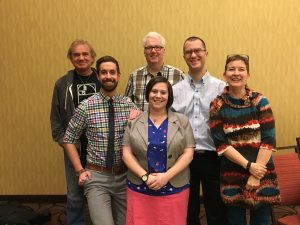
ULFA representatives at the CAFA conference. From left to right: David Kaminski, Derrick Antson, Dan O’Donnell, Annabree Fairweather, Paul Hayes, Andrea Amelinckx.
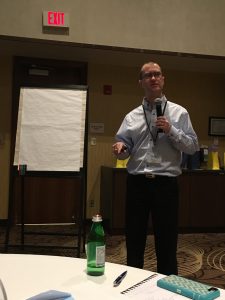
Paul Hayes speaking at the CAFA conference
The conference was proposed and organised in part by ULFA Executive Director Annabree Fairweather and ULFA executive and negotiating team members spoke on a number of different topics:
- Executive Director Annabree Fairweather (the new legal environment);
- Economic Benefits Chair/Negotiating team member Paul Hayes (the history and rationale behind ULFA’s 2015-2016 job action fund discussions and vote);
- Handbooks Chair/Negotiating team member Daniel Paul O’Donnell (communicating with members);
- Negotiating team resource person Terry Sway (Duty of Fair Representation).
In addition, Faculty of Management professor Kelly Williams-Whitt spoke on the interaction among different pieces of legislation since the passing of Bill 7 last year, including Essential Services and Occupational Health and Safety.
The conference was the latest in a series of events held by Alberta Faculty Associations to prepare for the upcoming round of negotiations.
Mar 12, 2018 | Bargaining
The University of Lethbridge Faculty Association (ULFA) bargaining team has held six of the scheduled ten “Meet and Greet” sessions with academic staff Members from different units on campus. (You can see the schedule for the remaining sessions here. All Members are welcome at all sessions: you do not need to be a member of the targeted group to attend any session).
The sessions begin with a short talk from the bargaining team describing the context of this year’s bargaining, some of the issues involved, and the question of Lockout/Strike. The floor is then opened to questions and discussion. Since the Bargaining team is interested in hearing from Members, the questions go both ways: Members ask the bargaining team questions, and the bargaining team asks the Members.
Sessions have been generally well attended and discussion has tended to go beyond the hour scheduled for the meeting. Among the top issues raised by Members are
- Accounting for workload differences among different ranks and groups;
- The PAR process (weighting, appeal, expectations);
- Health benefits;
- Salary issues;
- Designation issues (designation refers to the question of who and what types of work are represented by ULFA);
- Communication;
- Essential Services.
The bargaining team has used these sessions to give a broad outline of our strategy and expectations for this round of negotiations.
We have benefited immensely from the contributions of Members in these discussions. We have learned of the broad variety of workload issues on campus, discovered a number of people who carry out what are arguably essential services as part of their self-assigned duties, and heard real issues people have had in accessing health benefits, among many other topics.
In some cases, these discussions will play directly into our negotiations for this year. In other cases, they point to issues we will need to address in future rounds of negotiations. We thank the participants thus far for their ideas and look forward to meeting with other Members at upcoming events.
Mar 11, 2018 | Bargaining
In a letter dated March 6, 2018, the Board of Governors of the University of Lethbridge issued ULFA with a Notice to Bargain the Faculty Handbook. This notice depends on a disputed interpretation of the Labour Relations Code that was the subject of a recent hearing before the Alberta Labour Relations Board. The two sides are currently awaiting a ruling by the Labour Board.
Opens nearly all sections of the Faculty Handbook
In their letter, the Board proposes negotiating most sections of the Faculty Agreement:
- Preamble/Objectives
- Article 1 Interpretation
- Article 2 Definitions
- Article 3 Amendments
- Article 4 Application and Exclusions
- Article 5 Recognition
- Article 6 Communication and Information
- Article 7 Annual Meeting
- Article 8 Delegation
- Article 11 Rights and Responsibilities
- Article 13 Assignment of Duties
- Article 15 Appointment of Instructors
- Article 16 Termination of Appointment
- Article 17 Personnel Committees
- Article 18 Appointment of Faculty Members
- Article 22 Grievance Procedure
- Article 23 Mediation
- Article 25 Supervision and Discipline
- Article 26 Termination of Appointment for Financial Emergency or Due to Program Redundancy
- Schedule C Negotiation and Impasse–Resolving Procedures
- Schedule H Code of Conduct of Board of Governors Faculty Representatives
As we noted in response to the Board’s notice regarding the “Sessional Lecturers Handbook” this is an unusually broad list of articles, which has the potential to fundamentally affect the conditions under which members of the Academic Staff are employed.
In a blog post commenting on our case at the ALRB, labour expert Bob Barnetson described the Board’s letter on the Sessionals Handbook as being unusually “aggressive.”
It is also the case, however, that the changes introduced by Bill 7 may require technical changes to language throughout the Handbook and both sides were expecting that it might be necessary to open a wider number of articles than would normally be the case. The precise nature of the Board’s proposed changes will become clear after the two sides meet to exchange language, sometime after the ALRB rules on our case.
Not a Notice to Bargain
As mentioned in our post on the Board’s notice to bargain the “Sessional Lecturers Handbook,” ULFA does not consider letters that refer to only one part of the Bargaining Unit or Collective Agreement to represent valid notices to bargain. ULFA had, however, already issued a bargaining notice of its own covering the entire collective agreement on Monday, March 5.
Time will tell
As we discussed previously, it is important to remember that all negotiating documents from either side, including the University’s letters of March 6 and January 22nd, are presented “without prejudice” until a final agreement is reached. This means that while the University may have proposed opening a large number of topics, that is no guarantee that all these topics will be discussed or that an agreement will be reached on all articles mentioned. It is very common for negotiating teams to alter or withdraw proposals and items for discussion in the course of bargaining. As a rule, moreover, it is easier to withdraw than add items for negotiations. This encourages teams to overestimate what they will discuss, rather than underestimate.
The ULFA negotiating team has trained for various approaches to bargaining, including comprehensive bargaining across the collective agreement. It is fully prepared to begin negotiations on the entire collective agreement either immediately or after the ALRB has ruled on our application for a ruling.
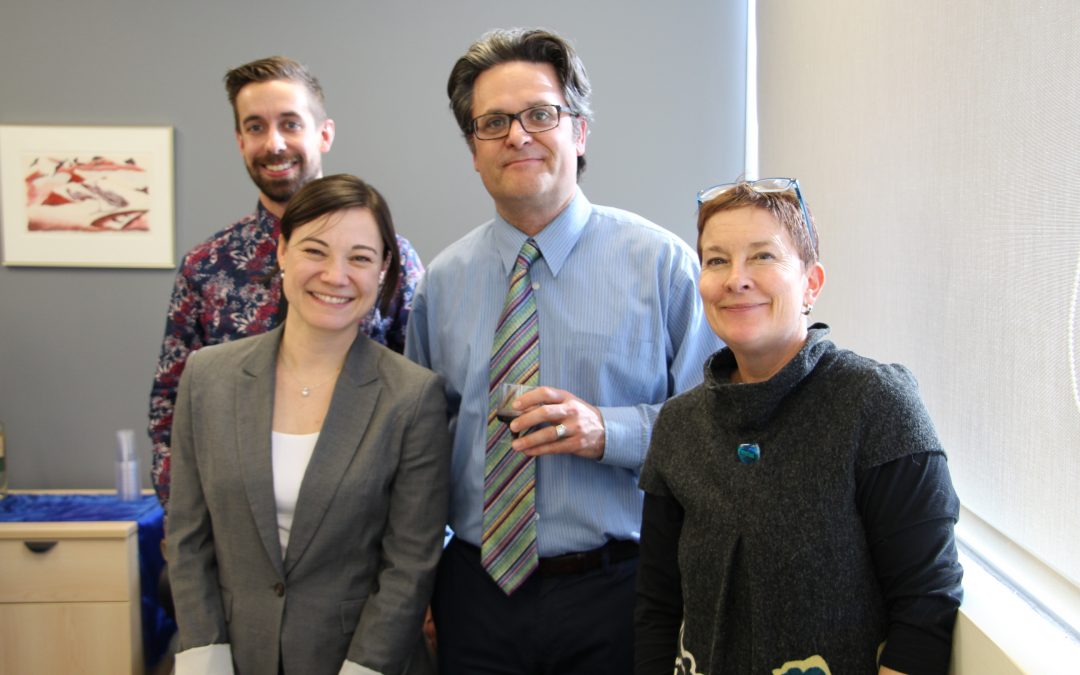
Mar 8, 2018 | Bargaining
Members of the University of Lethbridge Faculty Association Executive (ULFA) and other academic staff met several times with representatives of the provincial government in Lethbridge on Feb. 26.
The meetings were both informative and reassuring. Among the main takeaways:
- The government is committed to stable and predictable funding for the Post-Secondary sector, in keeping with its election promises and previous actions: “Past behaviour is the best predictor of future action” one official said.
- The government provides operating funds to the University, we were told, but does not instruct management as to how those funds should be spent or how to bargain with its employees.
- The provincial government would look very unfavourably on any attempt by employers to force employees into concession through job action.
Taken together, these comments suggest a very positive environment for negotiations this Spring.
At the February 15 Board of Governors meeting, Vice President Finance Nancy Walker submitted a proposal “to operate under the same operating and restricted funds budget for 2018-2019 that was approved by the Board of Governors for the 2017-2018 fiscal year until we are informed of our 2018-2019 Campus Alberta grant.” The information we received, however, indicates that the University can expect the stable and predictable funding it has been promised and has received thus far in each year of this government’s term.
The indication that there is no provincial mandate for negotiations in 2018 in the Post Secondary sector also answers rumours that suggested that university administrations had been given secret targets for wage concessions by the government. In keeping with past behaviour, the government is committed to stable, though not opulent, funding for the sector and university administrations have the freedom to negotiate in good faith with employee groups on campus. In previous years, with similar funding under this government, the university administration has shown itself to be willing to reach fair wage settlements with ULFA.
The final point addresses concerns about the structural disparity between employers and employees in the post-secondary sector introduced as a result of Bill 7 last year (the bill that introduced Strike/Lockout as a Supreme Court required mechanism for resolving negotiation impasse). Although Unions need to save funds over time in order to establish a job action fund, employers do not need to save in order to support a lockout: it is as expensive (or cheap) for employers to lock out academic staff this year as it will be ten years from now; unions, on the other hand, are as a rule far less able to withstand job action this year than they will be in a decade once they establish sufficient defense funds. This gives employers a potential structural advantage in negotiations, perhaps encouraging them to demand more concessions than they might otherwise expect to win were the two sides more equally able to withstand job action.
This has always been less of a concern at the U of L: since ULFA members voted to establish a job action fund in 2016, the union has had time to build a fund that is already sufficient to protect members in the event of job action. The government’s indication that it expects there to be no job action in this current round of negotiations does not considerably reduce the risk of miscalculation on either side, however.
The Provincial budget is expected March 22nd, at which point clarity and certainty will be realised. We anticipate that negotiations will begin soon after the budget is tabled.
Note
This post is intended to update the membership of ULFA about the current state of negotiations between the Union and the University. The information it contains is provided without prejudice and is intended for a general, non-specialist audience. While every effort has been made to ensure that the information this post contains is accurate, it does not represent an official legal or negotiating position. In the event of a disagreement between this post and an official notice or document, the official document is correct.







